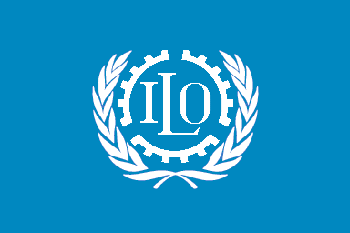 SKC Films Library SKC Films Library |
| SKC Films Library >> Economics >> Labor >> Trade and Labor Unions |
| International Labor Organization The ILO is a specialized agency of the United Nations that promotes cooperation between governments and employers' and workers' organizations in fostering social and economic progress by formulating, and where appropriate, implementing national policy on social, economic, and many other issues. Its main aims are to promote rights at work, encourage decent employment opportunities, enhance social protection and strengthen dialogue on work-related issues.
The chief policymaking body of the ILO is called the International Labor Conference, which meets annually to establish international labor standards covering such matters as child labor, job discrimination, and worker safety. Each member nation sends four delegates to the Conference, two from government and one each from labor and management. Although each group of delegates represents a specific member nation, each individual delegate speaks and votes independently. Standards adopted by the Conference are backed by a supervisory system that helps to ensure that countries implement the conventions they ratify. Between conferences, the ILO is supervised by a Governing Body, which meets three times a year in Geneva, Switzerland. It takes decisions on ILO policy and establishes the program and the budget, which it then submits to the Conference for adoption. The permanent staff of the ILO is called the International Labor Office, which conducts research, publishes labor information, and provides technical assistance to developing nations. It is supported by committees of experts on such matters as vocational training, management development, occupational safety and health, industrial relations, workers' education, and special problems of women and young workers. The Office itself is based in Geneva, but administration and management are decentralized in regional, area, and branch offices. The ILO was established as part of the Treaty of Versailles that ended World War I. The Constitution was drafted between January and April 1919 by the Labor Commission set up by the Peace Conference. The Commission, chaired by Samuel Gompers, was composed of representatives from nine countries -- Belgium, Cuba, Czechoslovakia, France, Italy, Japan, Poland, the United Kingdom and the United States. The first International Labor Conference, held in Washington in October 1919, adopted six International Labor Conventions, which dealt with hours of work in industry, unemployment, maternity protection, night work for women, minimum age and night work for young persons in industry. The ILO became part of the United Nations after the League of Nations was dissolved in 1946. The Organization received the Nobel Peace Prize for its work in 1969. The ILO's official website is www.ilo.org. SEE ALSO |
| SKC Films Library >> Economics >> Labor >> Trade and Labor Unions This page was last updated on June 06, 2017. |
